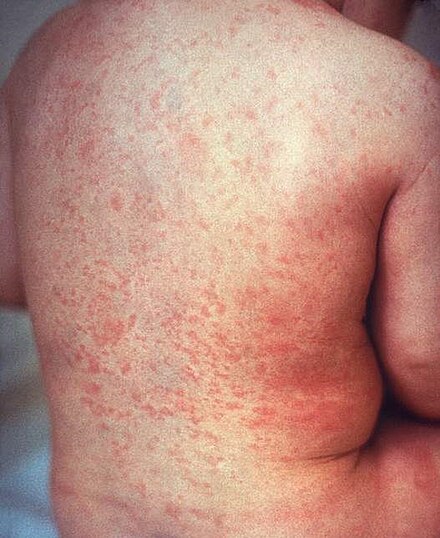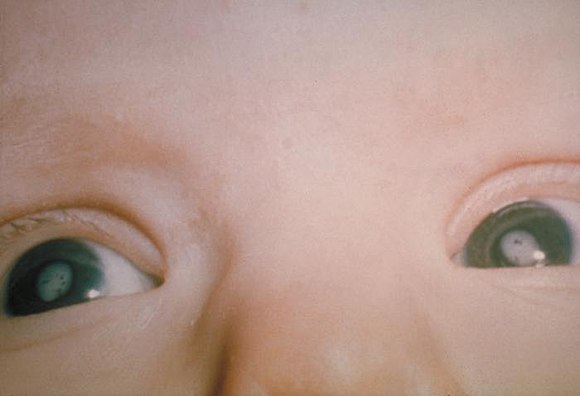Rubella
Rubella, also known as German measles or three-day measles, is a viral infection caused by the rubella virus. It is generally mild, with many cases going unnoticed. However, it can have severe consequences, particularly when contracted during pregnancy.

Signs and Symptoms

Rubella symptoms are similar to those of the flu. The primary symptom is a rash that starts on the face and spreads to the trunk and limbs, typically fading after three days. This rash is less intensely red than that of measles and may be itchy. Other common symptoms include low-grade fever, swollen lymph nodes, joint pains, headache, and conjunctivitis. In children, the rash usually clears as it spreads, and the fever rarely exceeds 38°C (100.4°F). Adults, especially females, may experience joint pain and arthritis. Severe complications can include encephalitis, low platelet count, and ear infections.
Congenital Rubella Syndrome (CRS)

Rubella infection during early pregnancy can lead to congenital rubella syndrome (CRS), characterised by severe birth defects such as cataracts, deafness, heart defects, and brain damage. The risk of major defects is highest during the first trimester, making vaccination important for women of childbearing age.
Cause

Rubella is caused by the rubella virus, a member of the genus Rubivirus from the family Matonaviridae. It is transmitted through respiratory droplets and replicates in the nasopharynx and lymph nodes. The virus appears in the blood 5-7 days post-infection and can cross the placenta, affecting the developing foetus.
Diagnosis
Diagnosis of rubella is confirmed by detecting rubella virus-specific IgM antibodies in the blood, throat, or urine. These antibodies can persist for over a year, so a positive test result must be interpreted with caution. The presence of antibodies alongside the characteristic rash helps confirm the diagnosis.
Prevention
Rubella is preventable through vaccination. The rubella vaccine, often administered as part of the MMR (measles, mumps, rubella) vaccine, is over 95% effective with a single dose. The WHO recommends the first dose at 12-18 months and a second dose at 36 months. Pregnant women should not receive the vaccine due to the live virus it contains. Instead, they should be vaccinated postpartum if they are susceptible.
Treatment
There is no specific treatment for rubella. Management focuses on alleviating symptoms, such as using antipyretics for fever and analgesics for joint pain. For newborns with CRS, treatment is directed at managing complications, including surgical correction of heart defects and cataracts.
Prognosis
Rubella infection in children and adults is generally mild and self-limiting, often asymptomatic. However, the prognosis for children born with CRS is poor due to the potential for severe and multiple congenital defects.
Epidemiology
Rubella occurs worldwide, with a tendency to peak in the spring in temperate climates. Before the introduction of the vaccine in 1969, widespread outbreaks occurred every few years. The disease has become rare in countries with high vaccination rates, but it remains a significant health issue in regions with lower vaccination coverage. The Americas have been declared free of endemic rubella transmission since 2015, but vigilance is necessary to prevent reintroduction from other areas.
Understanding rubella, its prevention, and its potential complications is essential for healthcare professionals, including dentists, to ensure comprehensive patient care.
Self-assessment MCQs (single best answer)
Which of the following is the primary symptom of rubella?
What is the primary mode of transmission for the rubella virus?
Which population is at the highest risk for severe complications from rubella?
What is the effectiveness of a single dose of the rubella vaccine?
Which of the following is NOT a common symptom of rubella?
What is the recommended age for the first dose of the MMR vaccine?
Which severe complication is specifically associated with congenital rubella syndrome (CRS)?
How is rubella diagnosed?
Why should pregnant women not receive the rubella vaccine?
What is the prognosis for children born with congenital rubella syndrome (CRS)?
Dentaljuce
Dentaljuce provides Enhanced Continuing Professional Development (CPD) with GDC-approved Certificates for dental professionals worldwide.
Founded in 2009 by the award-winning Masters team from the School of Dentistry at the University of Birmingham, Dentaljuce has established itself as the leading platform for online CPD.
With over 100 high-quality online courses available for a single annual membership fee, Dentaljuce offers comprehensive e-learning designed for busy dental professionals.
The courses cover a complete range of topics, from clinical skills to patient communication, and are suitable for dentists, nurses, hygienists, therapists, students, and practice managers.
Dentaljuce features Dr. Aiden, a dentally trained AI-powered personal tutor available 24/7 to assist with queries and provide guidance through complex topics, enhancing the learning experience.
Check out our range of courses, or sign up now!


